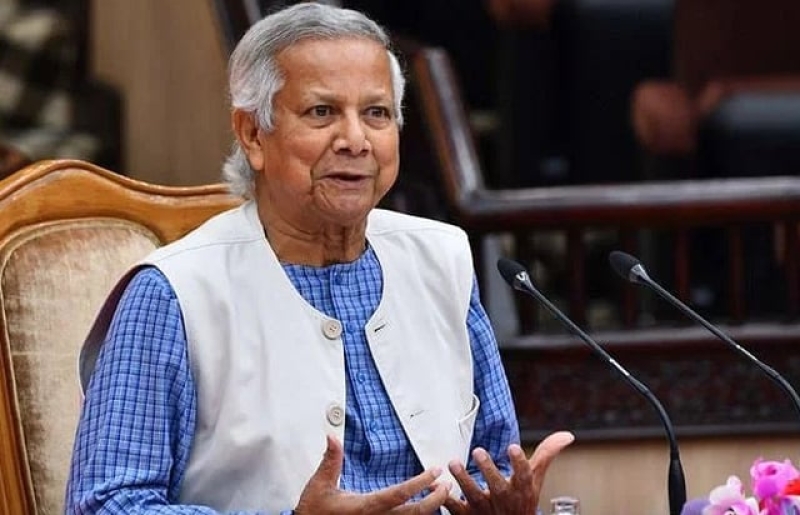- Guterres Urges Leaders to Act as UNGA Week Begins |
- BNP to go door to door for hearts and votes |
- Chittagong port tariffs increased up to 50 per cent |
- Rising Heat Cost Bangladesh $1.8 Billion in 2024 |
- Stocks extend gains; turnover drops in Dhaka, rises in Ctg |
Interim Govt Starts Gaining People's Trust and Confidence

Chief Adviser Prof Muhammad Yunus
The interim government led by Chief Adviser Prof. Dr. Mohammad Yunus is steadily restoring the trust and confidence of the people, a stark contrast to the disillusionment that marked the previous regime. This shift has largely been attributed to the government’s inclusive approach to decision-making and its proactive stance on addressing critical national issues.
Since assuming office on August 8, following a mass upsurge, the interim government has implemented several key measures aimed at rebuilding the nation’s fractured confidence. These include administrative reshuffling, action against corruption, rehabilitation for victims of the July uprising, the establishment of reform commissions, and efforts to reestablish strong relationships with international development partners.
Speaking to BSS, female coordinators and key activists from the Anti-Discrimination Student Movement—an influential force in the August protests—praised the interim government’s responsiveness. With 92 days in office, the interim administration has made notable strides in restoring stability and securing public support.
Restoring Trust Through Immediate Action
“The interim government has earned the trust of the people through swift, inclusive actions,” said Nusrat Tabassum, a prominent coordinator of the Anti-Discrimination Student Movement. “In a short time, the government has managed to restore a level of public confidence that was previously unseen in recent history.” She emphasized that this was the most significant achievement of the interim administration.
Nusrat pointed to two key aspects of the government’s approach: reviewing decisions and correcting mistakes where necessary, and giving considerable weight to public opinion. “Unlike the past regime, which ignored the voices of ordinary people, this government is committed to listening and adapting based on popular sentiment,” she added.
The government’s responsiveness has been especially notable in its approach to addressing pro-people issues, leading to high expectations from citizens across the country. People from all walks of life, including student leaders and protesters, are now turning to the government for solutions, reflecting the public’s renewed sense of optimism.
Restoring Faith in Democracy
Umama Fatima, spokesperson for the Anti-Discrimination Student Movement, stressed that for democracy to function effectively, citizens must trust their government. After years of authoritarian rule, this trust had been severely undermined. However, Umama noted that in just a few months, the interim government has begun to restore this vital trust.
“People are now standing by the government, protecting it in times of crisis, such as during floods, and helping maintain public order,” Umama said. “This is a testament to the trust people have placed in this new administration.”
The government’s efforts have not only won over citizens, but also boosted the nation’s economy. There has been a significant rise in remittance inflows, with migrant workers increasingly using formal banking channels instead of illegal methods, contributing to a strengthening of the country's foreign exchange reserves.
However, Umama called on the government to increase its communication with the public to enhance the effectiveness of ongoing reforms and ensure that public services remain efficient and transparent.
Taking Public Opinion Into Account
Rupaiya Shrestha Tanchangya, an active protester from the very beginning of the movement, expressed admiration for the government’s approach in engaging with citizens from diverse backgrounds before making policy decisions. “It’s unprecedented for a government to actively seek opinions from the public, irrespective of their beliefs or ideologies,” she said.
Shahinur Shumi, a coordinator from Eden Mohila College, echoed similar sentiments, emphasizing that the people’s high expectations of the government are directly tied to the sacrifices made during the mass uprising. She stressed that the government must prioritize addressing the rising cost of living and ensuring the safety of citizens.
A Focus on Public Needs
Nazifa Jannat, central coordinator from East West University, highlighted the interim government’s swift and effective responses to key crises, including the floods, public security challenges, and price hikes. She urged the government to prioritize the security of every citizen and take immediate action against market syndicates driving up commodity prices.
“If the government fails to address the pressing needs of the people, it risks losing the public’s trust,” Nazifa warned. “People will not tolerate inaction. Visible improvements must be made to solve the country’s most pressing issues, especially in terms of affordable living and security.”
While the interim government has made significant progress in rebuilding trust and confidence, it remains crucial for leaders to stay attuned to the public’s demands and expectations. If the government continues to act with transparency, prioritize pro-people issues, and engage in open dialogue with the citizens, it may well solidify its legacy as a responsive and responsible administration.

